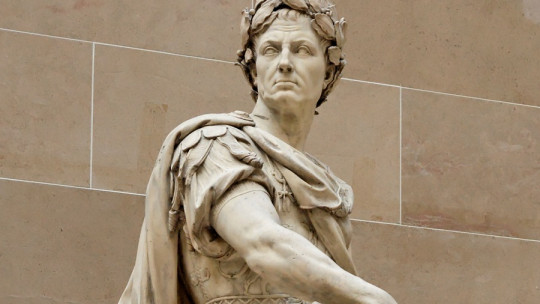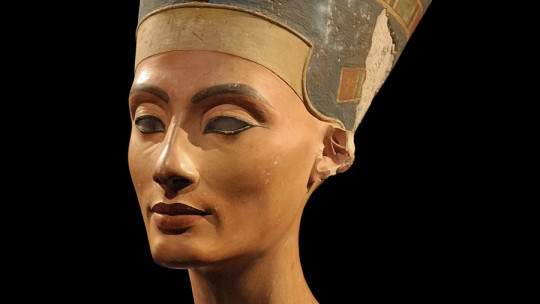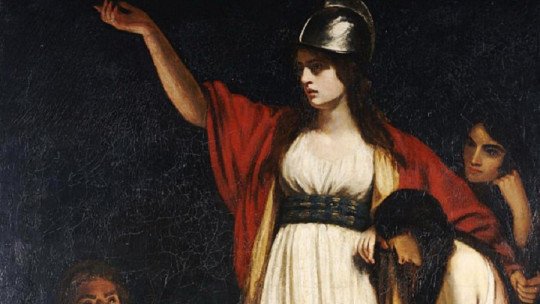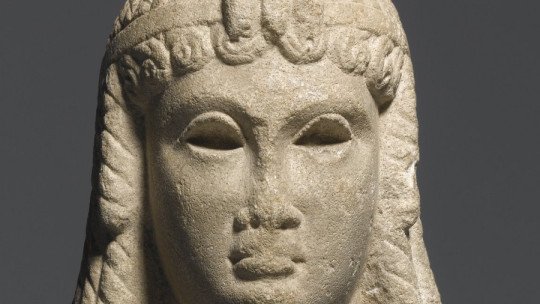
Plutarch described it in his Parallel lives as the origin of all the evils of Mark Antony For the historians Virgil and Horace she was practically a whore, an extremely ambitious and manipulative woman, exactly the opposite of Octavia, the prudent and devoted Roman wife of Mark Antony. That was the image of Cleopatra that survived for many centuries, testimony on which the successive dramas written about her were based.
History, as they say, is written by the victors. And it so happens that all of these historians that we have cited (with the exception of Plutarch, who is later, but who takes up the witness of his predecessors) lived in the time of Octavius Augustus, the staunch enemy of the queen of Egypt and her husband Marco Antonio. It is obvious, then, that after the lovers’ resounding defeat in the naval battle of Actium (31 BC), Augustus tried to leave a corrupted image of his rival.
So, Who really was Cleopatra VII? Is the idea we have of it consistent with what it really was? Join us to discover it.
Brief biography of Cleopatra, queen of Egypt
When talking about Cleopatra, probably the image that comes to mind is that of a splendid Elizabeth Taylor, who played the queen of Egypt in Mankiewicz’s famous film which, by the way, was a resounding failure. Precisely, the film was based on what Plutarch left written about the sovereign. Let’s see what this queen of Egypt was really like throughout this biography of Cleopatra.
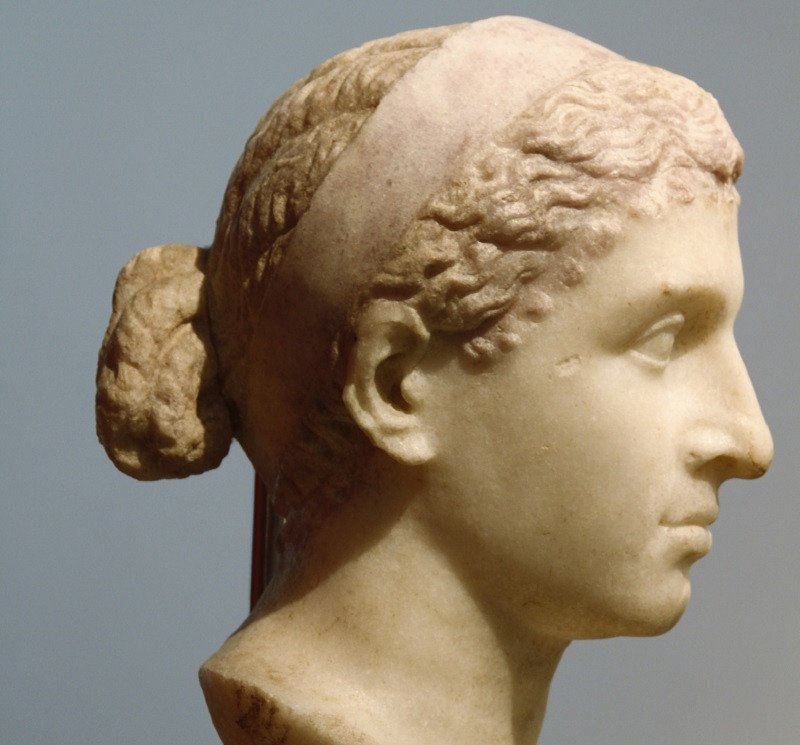
There are few reliable images of the queen that we have left to be able to look her directly in the eyes. In one of them, an exquisite marble head preserved in the Altes Museum in Berlin, experts believe they see the features of the Egyptian queen, as they resemble those of the effigies on the coins she minted.
If it is true that the person portrayed is Cleopatra, her real image is far from what the legend has transmitted to us about her; In the marble head we see a rather humble woman, with a simple “Roman-style” hairstyle and the most ordinary features, which exude prudence, intelligence and wisdom. In other words, We can detect nothing in this head that makes us think about the femme fatale on which his detractors placed so much emphasis So who was Cleopatra?
A Greek queen in Ancient Egypt
Despite being the queen of the country of the Nile, Cleopatra He belonged to a Macedonian dynasty, descended from Ptolemy Lagos, general of Alexander the Great who, after his death, stayed in Egypt and established the Ptolemaic dynasty. That is to say, by family culture, Cleopatra was Greek, not Egyptian. Her name itself indicates this: Cleopatra is a Greek name that means “glory of her father.” This father was King Ptolemy XII who, at the time his daughter was born, maintained more or less cordial relations with Rome.
Our protagonist was born around the year 68 BC in Alexandria, the city founded by Alexander the Great which, in those days, was the capital of Egypt. The city was so magnificent that any traveler who stopped there was captivated by its beauty and cultural splendor: the famous lighthouse, one of the seven wonders of the ancient world, stood majestically in the port, and its enormous library (which is estimated could have housed around 100,000 works) was the envy of the entire West.
Cleopatra was not destined to inherit the throne of Egypt, as she had two older sisters: Arsinoe and Berenice. As fate would have it, the path to power was clear when, while his father was in Rome closing deals with the Romans, these eldest daughters conspired against him, eager to preserve Egyptian autonomy.
Ptolemy XII found out about the betrayal and did not hesitate to execute his own daughters. Cleopatra was spared the sentence because it was proven that she had not participated in the conspiracy and that she had always remained faithful to her father. Thus, when Ptolemy XII died, the young woman ascended the throne as Cleopatra VII. However, there was an indispensable condition for her power as her sovereign to be ratified: she had to marry her younger brother Ptolemy and co-reign with him.
Alliance and romance with Julius Caesar
Incest was a common practice in the Ptolemaic dynasty, most likely inherited from the ancient customs of the Egyptian monarchs, who used to marry sisters and daughters. The idea behind this practice was that, through these blood ties, the divinity of the monarchy was reinforced.
Cleopatra She is eighteen years old when, together with her brother-husband (who will reign under the name of Ptolemy XIII), she ascends the throne of Egypt As expected, quarrels do not take long to appear; The advisors who manipulate the young Ptolemy (who is only ten years old) conspire to overthrow Cleopatra and crown the boy-pharaoh as the sole ruler of Egypt. To this end, and determined to attract the favor of the Romans to support them in their civil war, they assassinate Pompey, who has landed on the Egyptian coast fleeing from his mortal enemy, Julius Caesar. Afterwards, they send Pompey’s head to Caesar as a present.
The child-Pharaoh’s advisors made a big mistake; because Julius Caesar, faced with the enemy’s vision of him being treacherously murdered, flies into a rage. If there is something that Romans cannot tolerate, it is dishonorable death, and Pompey’s was that. Yes, thinks Caesar; He was my enemy, my rival for the power of Rome, but he deserved to die on the battlefield, not at the hands of some “vulgar” Egyptians. Blinded by fury and inflamed by the brutal belief in Roman superiority, Caesar relentlessly pursues the culprits.
This was the moment Cleopatra was waiting for. Eager to attract Caesar to her cause, she goes to visit him; according to Plutarch, she hidden inside a luxurious carpet When her servants unroll her, an attractive young woman in her early twenties appears before Caesar. The rest is well known, and has been sung by countless poets throughout history.
Some historians question the romance between Caesar and Cleopatra. That is to say, there was an emotional relationship, but the possibility is currently being considered that what actually moved both characters was more political ambition than love.
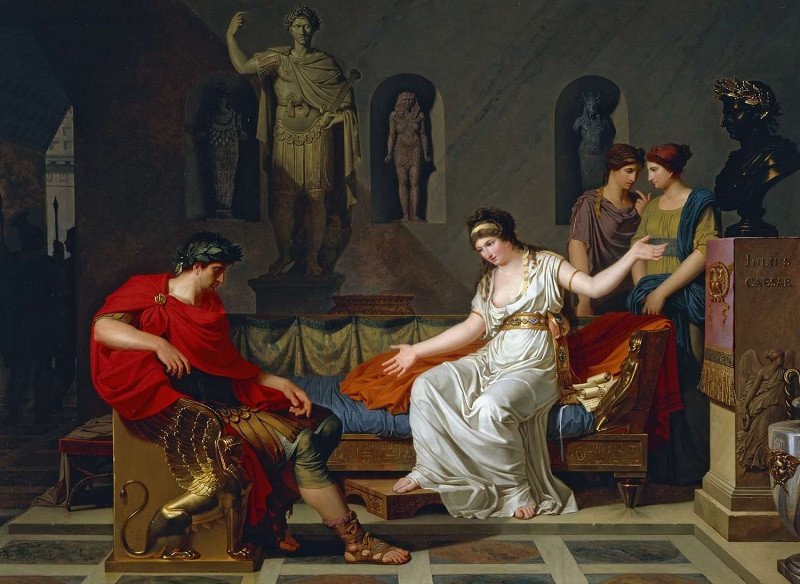
In the case of Caesar, and as the historian Rosa María Cid maintains (see bibliography), it is possible that his romance with Cleopatra was nothing more than a way to show his superiority towards Egypt. In fact, the queen traveled to Rome in those days, without it being known yet what the exact cause of the trip was; establish political pacts? Attend Caesar’s triumphal parade? The latter would have meant humiliating herself before the Romans, something that seems unlikely coming from a queen so jealous of the liberties of her people. Be that as it may, It is thanks to Caesar’s support that Cleopatra defeats her brother and is crowned the sole ruler of Egypt Maybe humiliation was the price he had to pay to achieve power, who knows.
Meanwhile, in the year 48 BC, the queen gave birth to Caesar’s son, Ptolemy Philopator, better known as Caesarion, the only biological son the dictator will have. This puts her in a delicate situation, since the child becomes, from his birth, a direct enemy of Octavian, Caesar’s nephew and designated as his successor. When Julius Caesar dies in the Ides of March plot in 44 BC, Cleopatra finds that she has not only lost her lover, but also her political ally. She is alone in front of the ambitious Octavio.
The new and definitive love: Marco Antonio
The year is 43 BC In Rome, Caesar’s assassins face a new civil war with Octavian’s supporters. The second triumvirate, formed by Mark Antony, Octavius and Lepidus, has not been successful; Relations between the first and the second are increasingly sour, especially since Mark Antony, who has the eastern part of the Roman Empire under his power, meets Cleopatra in Egypt. Octavian and his people take it as an affront to the power of Rome.
But how and why did the meeting take place? In Tarsus, present-day Türkiye, Cleopatra receives the Roman dressed as the goddess Aphrodite It seems that the attraction is immediate, and that both begin a passionate relationship that will last more than ten years. In Rome, Mark Antony’s wife, Fulvia, rebels against such betrayal and starts a real war against her husband. Octavio seconds her; The affront is too great. Mark Antony has not only betrayed Rome by settling in Egypt and taking pleasure in his queen, but he has also dared to repudiate his Roman wife. Octavio sees all this as the perfect excuse to get rid of his former ally.
The incarnation of the goddess Isis
Meanwhile, in Egypt, Cleopatra has changed her policy. Although she was always a queen very concerned about preserving the ancient culture of Egypt (she addressed her subjects in ancient Egyptian instead of using Greek), let us not forget that she came from a Macedonian dynasty, so culturally she was much closer to Greece and Rome. But after Caesar’s death, the queen becomes orientalized, thus making it very clear where her sympathies lie.
It is at this time when Cleopatra takes on the attributes of the goddess Isis, the feminine divinity par excellence of the land of Egypt, giver of life and protector of women and childbirth. Characteristic of the time is the representation of Isis lactans, that is, the nurturing goddess who breastfeeds her son Horus, who rests on her knees. An image that, by the way, was later passed on to Christianity in the iconography of the galactotrofusa, that is, the Virgin of milk.
In the temple of Dendera, in middle Egypt, we find one of the best examples of Cleopatra as a goddess. It is dedicated to the goddess Hathor, and in the reliefs of the temple Cleopatra appears along with Caesarion, replicating the image of Isis with that of her son Horus. This propaganda campaign is extremely important, since Cleopatra is not being shown as a foreign Greek, but as an Egyptian (and not just any Egyptian, but nothing less than her most important goddess), and her son Caesarion, son of a Roman, is being equated to the falcon god, Horus.
All this testifies to the intelligence and unquestionable political validity of the sovereign of Egypt, as well as her undeniable culture. We have already said that she addressed her subjects in Egyptian; But she also spoke nine more languages. Cleopatra was an extremely erudite woman, knowledgeable not only of Greek culture, inherited from her ancestors, but also of the country over which she reigned A sovereign always attentive to the needs of her people, she tried to use her prudence, her political talent and her undoubted charms to place herself and Egypt in the best of her positions.
The end of a queen
The relationship with Marco Antonio was by no means constant or homogeneous. The lovers separate briefly in 40 BC; Once Fulvia, his first wife, has died, the Roman returns to his homeland to marry Octavian’s sister, in a desperate attempt to ingratiate himself with him. Having already rejected the expectation, Cleopatra remains in Egypt and gives birth to Mark Antony’s children, the twins Cleopatra Selene and Ptolemy Helios.
However, partly because of the passion he feels towards the Egyptian queen, partly because no one supports him in Rome, Mark Antony returns to Cleopatra in the year 37 BC. Their union may then be more of a political alliance than a relationship. loving, which does not prevent Cleopatra from giving the Roman another son, Ptolemy Philadelphus.
And this is when the few ties that remained between Octavio and his former political ally are definitively broken. Mark Antony, permanently established in Egypt and finally married to Cleopatra, makes the well-known “donations of Alexandria”, by which he donates some lands to the children of the queen. This is a definitive insult to the Roman Republic, since Mark Antony has no power to decide on this. Furthermore, in the will he leaves, the Roman expresses the desire to be buried in Alexandria, next to Cleopatra, which has just confirmed his “betrayal” to Rome.
The war is not long in coming. In the famous naval battle of Actium, which took place in September 31 BC, Octavian’s troops resoundingly defeated those of Mark Antony and Cleopatra The lovers retreat towards Egypt, but their fate is already cast. Octavio has won, and there is only one thing left for them: to die with honor.
How did Cleopatra die?
The stories that we have left about the end of the lovers seem more taken from a Greek tragedy than from reality, but, in the end, they are the only testimonies we have to know what happened. According to Plutarch, Mark Antony killed himself with the edge of his sword. Once the queen finds out, and determined not to stay alive to avoid the humiliation that Octavian has prepared for her (parading as a war trophy in the Roman’s triumphal tour), Cleopatra also decides to end her life. She calls her most faithful servants, who bring her a basket of figs, among which is hidden an asp, one of the deadliest snakes in Egypt. Then, wearing her best clothes, Cleopatra lies down and extends her arm among the fruits. The bite of the animal and its powerful venom does the rest.
Is this reality, or is it just legend? Did Cleopatra commit suicide, or was she murdered, as many historians suspect? The murder theory is not very plausible; If Octavian planned to humiliate her before the people of Rome, it makes no sense that he ended her life before leaving Egypt. The theory of suicide is therefore reinforced, although the story of the basket of figs seems more like an ornament by Plutarch than a real event. Perhaps the queen simply ingested a common poison to kill herself.
Little is known about his children. Although he tried to protect them, knowing that, after his death, Octavian would be cruel to them, he failed to save Caesarion, who was murdered for being Caesar’s heir and, therefore, the true obstacle to Octavian’s ambition. . The Republic ended and the Empire began, with Octavian Augustus as the first emperor of Rome.


